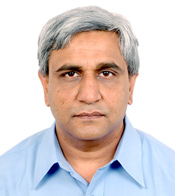Education Details
Doctor of Philosophy
Atmospheric Sciences, Indian Institute of Science, India, 1992.
Master of Engineering
Mechanical Engineering, Indian Institute of Science India, 1986.
Bachelor of Engineering
Mechanical Engineering, Rani Durgavati University, Jabalpur, India, 1984.
Title of Ph.D Thesis
Study of Intraseasonal Variations of the Tropical Convergence Zones in a Simple Monsoon Model.
Area of Interest
- Study of Monsoons using climate/meso-scale models.
- Application of High Performance Computing/Grid Computing for climate and weather-related studies
Honours
- Nvidia Innovation Award 2013.
- Adjunct Faculty, ICTS-TIFR 2011-present.
- Associate Editor, Journal of Earth System Sciences (published jointly by the Indian Academy of Sciences, Bangalore and Springer), 2008-2014.
- Sir C V Raman Young Scientist Award for the year 2000 in the field of Earth Sciences.
Work Experience
- Chairman, Centre for Atmospheric & Oceanic Sciences, Indian Institute of Science, December 2013-present.
- Professor, Centre for Atmospheric & Oceanic Sciences, Indian Institute of Science, July 2007-present.
- Associate Professor, Centre for Atmospheric & Oceanic Sciences, Indian Institute of Science, July 2001-July 2007.
- Asst. Professor, Centre for Atmospheric & Oceanic Sciences, Indian Institute of Science from July 1995-July 2001.
- Post-Doctoral Fellow in the CHAMMP (Computer Hardware, Advanced Mathematics and Model Physics for studying global change) project at the Mathematics and Computer Science Division of Argonne National Laboratory from February 1993-February 1995.
Recent Publications
- Sonali P, D N Kumar and R S Nanjundiah , 2013: Intercomparison of CMIP5 and CMIP3 simulations of the late 20th century temperature extremes over India and detection of climatic trends. Submitted to Global and Planetary Change
- Vinaychandran P N, J Sharief and R S Nanjundiah, 2015: Impact of River Runoff into the Ocean on Indian Summer Monsoon. Submitted to Environmental Research Letters.
- Karmakar N, A Chakraborty and R S Nanjundiah, 2015: Decreasing intensity of monsoon lowfrequency intraseasonal variability over India. Submitted to Environmental Research Letters, under revision.
- Govardhan G, R S Nanjundiah, S K Satheesh, K K Moorthy and V R Kotamurthi,2015: Performance of WRF-Chem over Indian region: Comparison with measurements Accepted for Publication in Journal of Earth System Science.
- Venkatesh, T N, J Mathew and R S Nanjundiah, 2014: Secondary instability as a mechanism for severe clear-air turbulence in the atmosphere. Meteorology & Atmospheric Physics, 126, 139-160.
- Anandhi, A and R S Nanjundiah, 2014: Performance evaluation of AR4 Climate Models in simulating daily precipitation over the Indian region using skill scores. Theoretical and Applied Climatology doi:10.1007/s00704-013-1043-5.
- Chakraborty,A and R S Nanjundiah and J Srinivasan, 2014: Radiative Impacts of Carbon Aerosols on South and East Asian Summer Monsoon: Proximate vs Remote. International Journal of Climatology, 34, 2108-2121.
- Doraiswamy, H, V Natarajan and R S Nanjundiah, 2013: An Exploration Framework to Identify and Track Movement of Cloud systems. IEEE Transactions on Visualization and Computer Graphics, 19(12), 2896-2905.
- Jain D, A Chakraborty and R S Nanjundiah, 2013: Role of Cloud Adjustment Time Scale on Simulation of Interannual Variability of Indian Summer Monsoon. Meteorology and Atmospheric Physics, 122, 159-173.
- Nanjundiah R S, P A Francis, M Ved and S Gadgil, 2013: Predicting the extremes of Indian summer monsoon rainfall with coupled ocean-atmosphere models. Current Science 104, 1380-1393.
- Das Gupta, A J, A S V Murthy, R S Nanjundiah and C V Srinivas, 2013: A linear model for the sea breeze circulation relevant to the tropical regions. International Journal of Geomathematics 4, 97-135 (doi:10.1007/s13137-013-0047-8).
Guidance of Students
- Ph.D, No. of Students Graduated 8, Currently Guiding 5
- M.Sc (Engg), No. of Students Graduated 4, Currently Guiding 2
- M. Tech. (Engg), No. of Students Graduated 7, Currently Guiding 1


